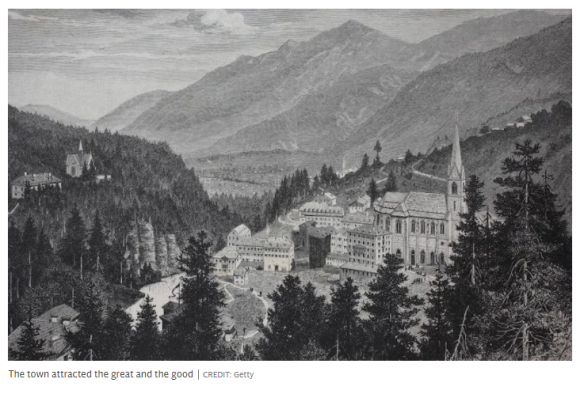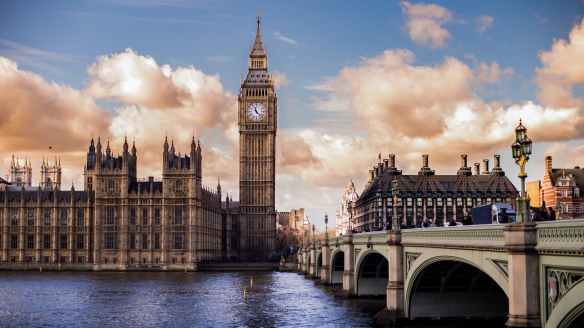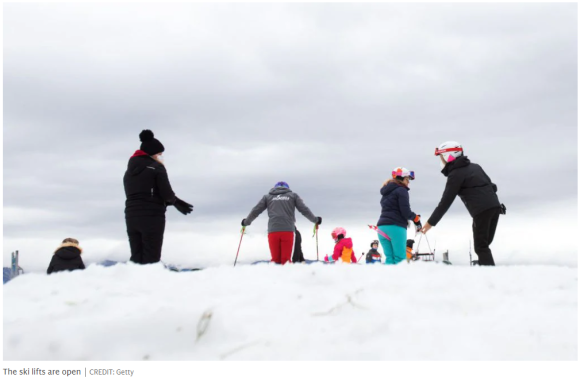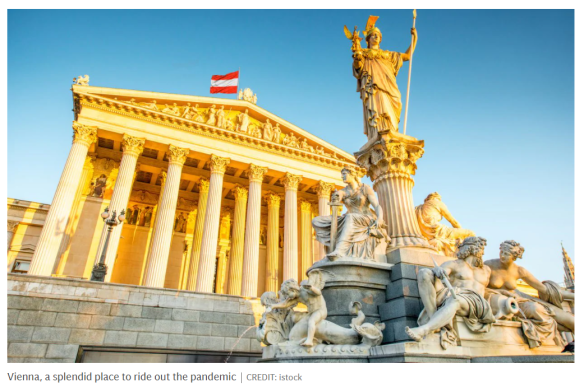THE TELEGRAPH
TRAVEL
A journey on the most storied railway in Spain
For the original article, available to subscribers only, please click here. It is also available, for free, on MSN here.
(This follows on from my Telegraph article on Gaucín three years ago, ‘A postcard from Spain’s most picture-perfect town‘, which went viral in Spain, from national newspaper ABC to ¡Hola! magazine.)
Gibraltar has always been an outpost. In antiquity it was one of the Pillars of Hercules on which were inscribed the warning to sailors: “nothing further beyond”. Its name derives from the Berber military commander who landed there and began the Moorish conquest of Spain in 711 AD. A thousand years and 14 sieges later the Rock became a British fortified-enclave. However, under the blistering Spanish sun its confines bred fever and mutiny. The inhabitants craved access to the mainland, looking up to the cooler mountains of Ronda, two days’ ride away up rocky, bandit-stricken trails.
To cater to this need, Alexander Henderson founded the Algeciras-Gibraltar Railway Company in 1888 in a deal with the Spanish government. Henderson had already built railroads across the mountains and jungles of South America. Not permitted to run the railway onto British soil, Henderson arranged a daily steamboat across the bay to the first station on the line at Algeciras, and all materials were shipped from England, right down to the station clocks. The result was – and still is – one of Europe’s most remarkable train journeys, but which today takes tourists, rather than British army officers, to Ronda in 90 minutes for €11.50.
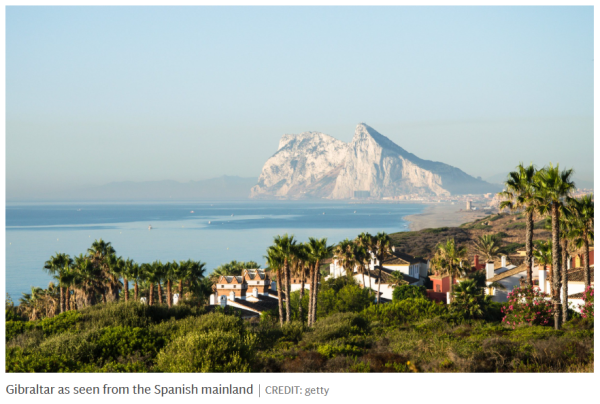
To ensure comfortable digs both before boarding and at journey’s end, Henderson also hired the architect of The Savoy to build the Hotel Reina Cristina at Algeciras and a sister establishment, the Hotel Reina Victoria, in Ronda. There are also stops in San Roque and Gaucín, offering the chance to break up the journey.
Today, Algeciras is an industrial port city and the Reina Cristina (rooms from £90), while a grand structure, is run down, its rolling gardens out of place between the docks and tenement buildings. In its time it hosted movie stars and politicians: Orson Welles and Ava Gardener, Roosevelt and Churchill (both as Prime Minister and earlier, as Telegraph reporter at the Algeciras Conference on the fate of Morocco in 1906). Its carefully restored twin in Ronda, the Reina Victoria (rooms from £100), remains a lovely hotel.
There are three daily trains along Mr Henderson’s Railway, departing at 06:20, 10:50 and 17:04. I boarded the second and headed out towards the mountainous backdrop of the Serranía de Ronda. The rails are far nicer than the road, exchanging motorways and flyovers for verdant coastal countryside. The steam trains have gone, but their smooth, air-conditioned replacements, operated by Renfe (the state-owned railway), are perfectly good.
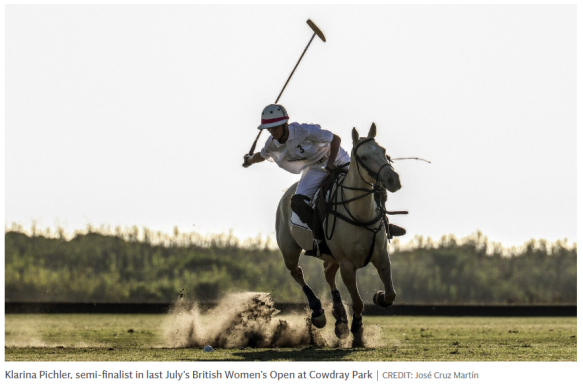
The original passengers were often British Army officers, which explains why the first stop along the line is San Roque, home to the luxurious Sotogrande with its famed polo clubs. It was the British Army who adopted this equestrian sport while serving in India and went on to teach it to the horse-obsessed Spanish nobility.
I disembark and head for lunch at the restored 18th-century marvel that is El Monasterio, one of the most beautiful small hotels in Andalusia. Afterwards I catch a practice session at the neighbouring polo ground, Luciano Irazábal and Nano Iturrioz’s ‘Iron Bridge’, and see Klarina Pichler, semi-finalist in last July’s British Women’s Open at Cowdray Park, the Wimbledon of the Game of Kings, and who coaches the British Royal Dragoon Guards who brought the sport to Europe. (Indeed, she is the only British Hurlingham Polo Association licensed instructor in Spain.)
I make the last train from San Roque at 17:18. From here it is all about the views and admiration of the technique and industry required to dynamite your way through the hillsides to follow the mountainous forest-course of the river Gaudiaro through the sparkling wonders of the Natural Park of Los Alcornacales.
A little over an hour later I arrive at Gaucín station, although it is a few miles from the town so a taxi is required. The last time I was here it was under the shadow of Covid-19. I am pleased to see Daniel Beauvoir’s La Fructuosa (rooms from €110) remains the most pleasant of village retreats, with elegant and spacious rooms looking out over the valley.
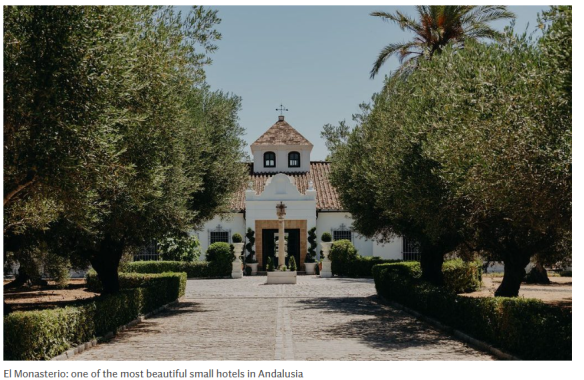
The real surprise, though, is Restaurant Azulete, under the new management of a Franco-Colombian couple: Parisian chef, Gabriel Arnaud, who met his wife Daniela Rodriguez while they were working Ferran Adrià of El Bullí fame, before they came here. In 25 years of writing about this country, I can’t recall a finer dining experience.
The final section of track winds through an undulating landscape, softening from epic to pastoral, a transition highlighted by the stop-motion effect of a dozen tunnels within 40 miles.
At the end of it all lies Ronda, the haven. A writer’s retreat, it has statues to visitors like Hemingway, the centenary of whose first visit to Spain is this year, and the Austrian poet Rilke.
I meet Jon Clarke, editor of the local English newspaper, at the tapas bar La Barrafina. He updates me on the gossip over thin-sliced jamón ibérico – the owner is a national champion jamón-cutter – and ice-cold manzanilla, before I check into one of his wife Gabriella’s self-catering apartments (rooms from €140), hidden gems a short walk from the Arab Baths along the city walls.
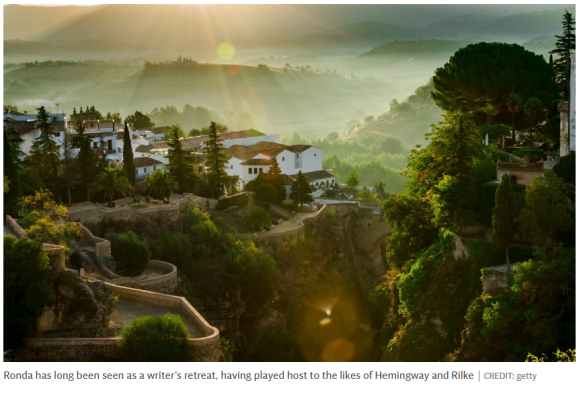
From there one can stroll up past the three historic bridges – Arab, Old and ‘New’ (1790s in vintage, 390 feet in height) – culminating in the vertiginous glories of the Tajo gorge, one of the most visited monuments in Spain.
Next to it is another, the 450-year-old Maestranza plaza de toros of Ronda, still operated by the longest running dynasty of matadors, whose present title holder, Cayetano Rivera Ordoñez, excels in the ring to this day.
Finally, one is at the breezy summit of one of the peaks of Spain’s history and culture. The steam from the locomotives may have long ago evaporated, and the gun-smoke of the bandits has dispersed, but the poetry of this coast-to-mountain, British-built train service remains as uplifting as it always was.








